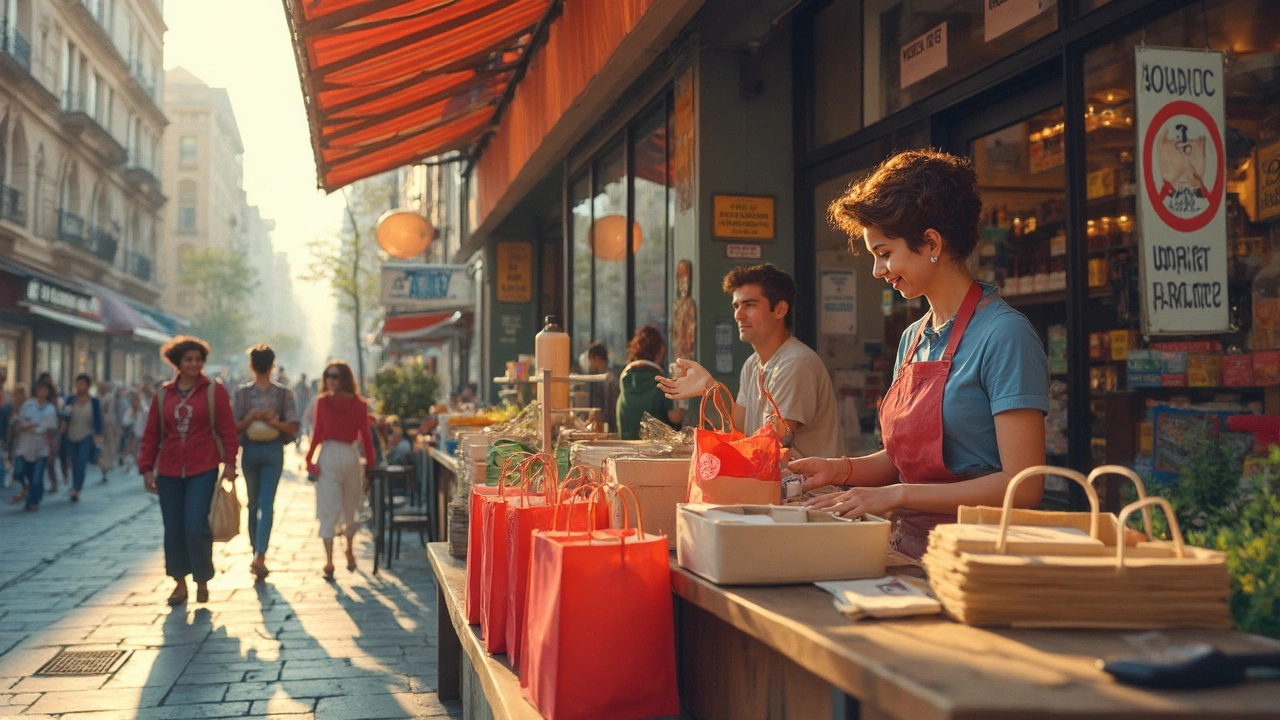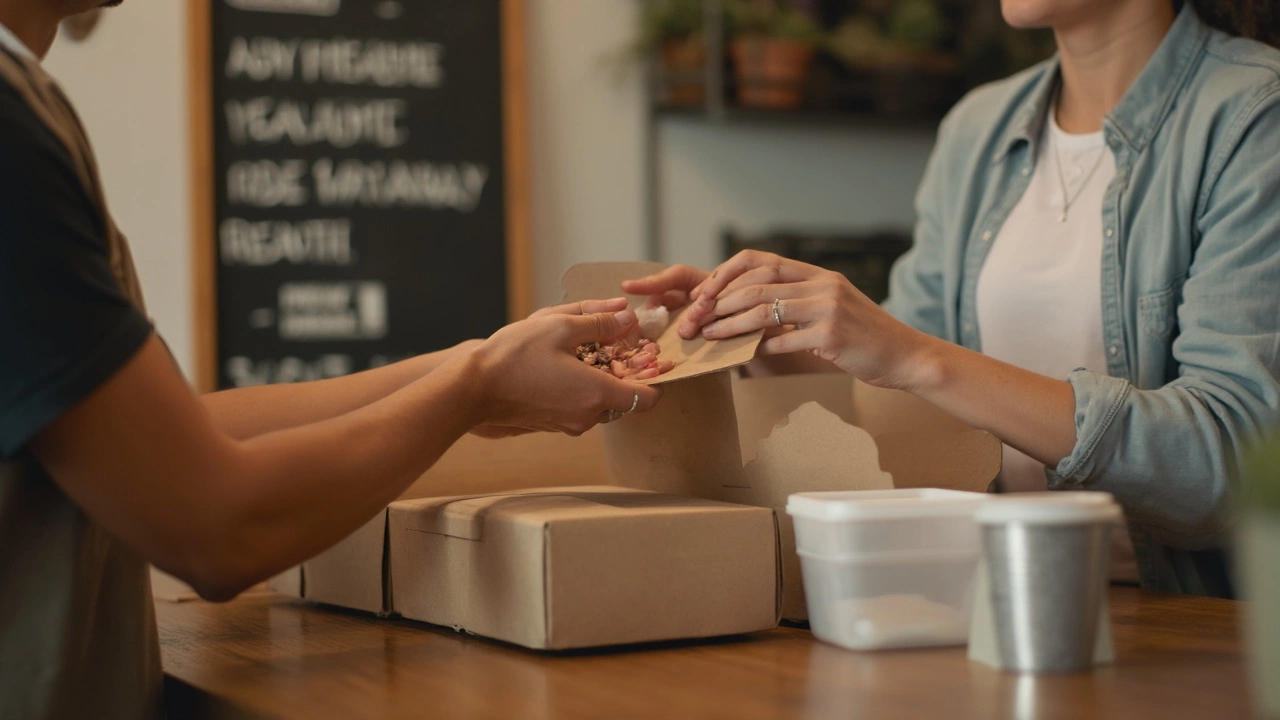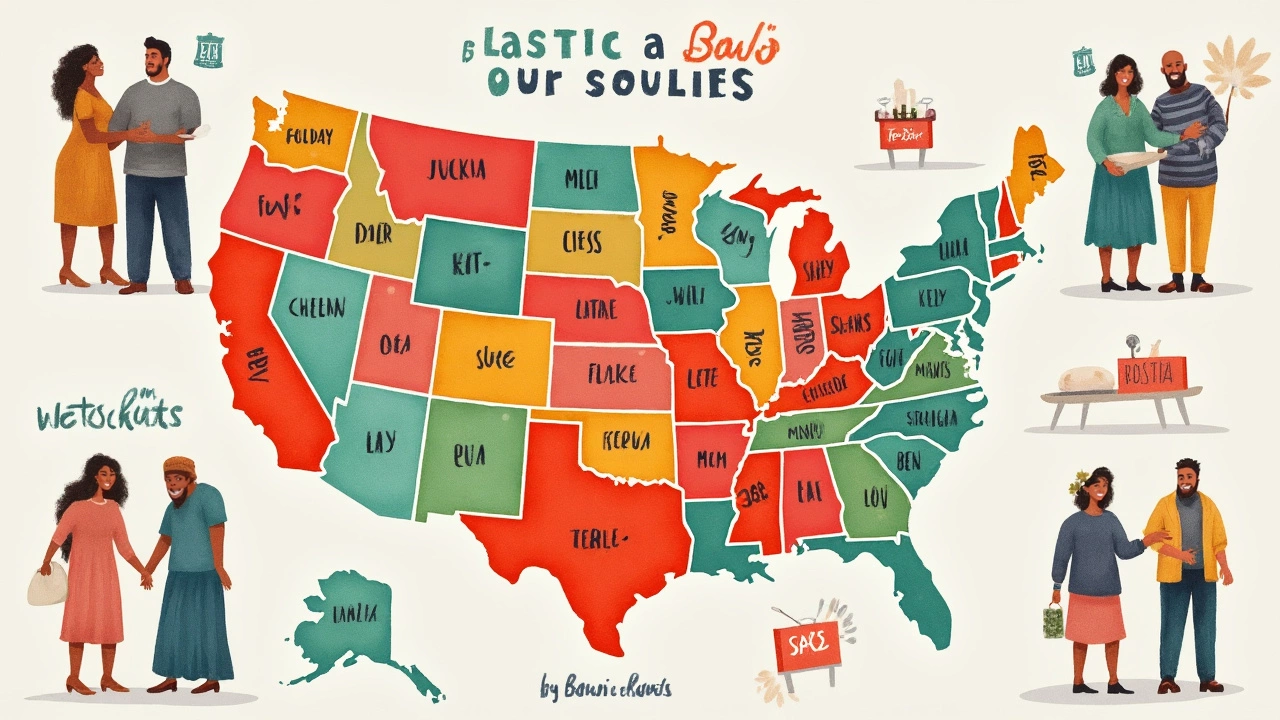 Apr, 18 2025
Apr, 18 2025
Plastic bans aren’t the same everywhere in the US, and there’s no federal rule that puts everyone on the same page. It’s really a patchwork—some states and cities go all-in on banning plastic bags or straws, while others refuse to touch the topic. You’d be surprised how much it changes just driving from one town to another.
States like California, New York, New Jersey, Oregon, and Maine have some of the toughest rules on single-use plastics. What does that actually mean? Think about no more plastic checkout bags at grocery stores and not getting that automatic plastic straw at your favorite coffee shop. Some places will even slap you with a fine if you offer single-use cutlery without being asked.
Businesses have had to scramble to keep up, switching to paper bags, compostable containers, or charging shoppers who forget their own bags. If you’re running a company, you need to stay sharp—just using the wrong container can end up costing you a penalty. Meanwhile, shoppers sometimes feel caught off guard when they get to the checkout and realize plastic isn’t even an option. If you’re traveling or moving between states, you can’t assume it’s business as usual everywhere.
- Where US Plastic Bans Stand Right Now
- States With Major Plastic Restrictions
- Key Cities Pushing the Limits
- How Plastic Bans Are Enforced
- Tips for Businesses in Plastics
Where US Plastic Bans Stand Right Now
The US is kind of a mixed bag when it comes to plastic bans. Some places are cracking down, others are barely talking about it. The federal government isn’t stepping in, so the decisions are mostly left to states, counties, and cities. This means the rules for things like single-use plastics—bags, straws, utensils—are different almost everywhere you go.
California was the first state to ban single-use plastic bags back in 2016. Since then, states like New York, Oregon, and New Jersey have joined in with their own rules. On the flip side, a handful of states (like Arizona and Florida) have laws that actually ban local governments from banning plastic. Yeah, it gets a bit confusing fast.
Here’s what the patchwork looks like:
- Statewide bans: Only a handful have blanket bans on items like plastic bags or foam containers.
- Local bans: Hundreds of cities or counties, even in states without statewide rules, have their own bans—think Austin, San Francisco, Seattle, and Boulder.
- Preemption laws: About a dozen states have rules that stop local governments from passing their own plastic bans.
Check out this quick overview of where bans stand across some main states:
| State | Plastic Bag Ban | Other Single-Use Bans |
|---|---|---|
| California | Yes (statewide) | Some cities ban straws, foam, utensils |
| New York | Yes (statewide) | Foam containers banned statewide |
| Oregon | Yes (statewide) | Straws on request only |
| Texas | No (preemption law) | Local bans blocked by state law |
If you’re in the plastic manufacturing business, this all matters a lot. Keeping up with these changing laws is key so you can pivot when states shift the rules—especially if you sell across different regions. And for regular folks, it pays to keep a reusable bag and water bottle on hand, since you never really know what the cashier will say until you get to the counter.
States With Major Plastic Restrictions
If you’re wondering where plastic bans actually mean business, certain states are way ahead of the curve. They're not just suggesting people use less plastic—they’re making laws that force change, especially for stuff like bags, straws, and foam containers. Here’s what’s really happening on the ground.
California pretty much kicked off the trend back in 2016 when it banned single-use plastic grocery bags statewide—the first state to do so. Now, if you want a bag at most stores, you’ll be buying a paper or reusable one. Plus, California also says "no" to most polystyrene foam food containers, and they limit tiny travel-size toiletries in hotels, swapping out those little plastic bottles for dispensers.
New York went statewide in 2020, banning almost all single-use plastic bags at stores. And yes, that means no more double-bagging at checkout. Some counties (like Suffolk on Long Island) even crack down on plastic straws and stirrers too.
New Jersey has one of the toughest plastic laws around. As of 2022, stores and restaurants can’t give out single-use plastic bags, period. And get this—stores can’t even use paper bags for grocery delivery. On top of that, polystyrene foam food takeout containers are also banned.
Oregon ruled out single-use plastic checkout bags in all stores and even adds a minimum charge for paper alternatives, so bringing your own bag saves you a few cents. They cap plastic straws so you can only get one if you ask. Maine also banned single-use plastic bags statewide and knocked out foam food containers, setting an example for smaller states to follow.
- Connecticut, Delaware, Vermont, Colorado, Washington, and Hawaii (sort of) also have broad plastic bag bans, with some taking it up a notch by limiting straws, containers, or utensils.
- Vermont goes big—not only banning single-use plastic bags but also single-use straws, stirrers, and polystyrene hot drink cups.
Want the numbers? Check out this quick comparison of key bans:
| State | Plastic Bag Ban | Foam Ban | Other Bans |
|---|---|---|---|
| California | Yes | Yes (food containers) | Mini toiletry bottles |
| New York | Yes | No | Straws limited |
| New Jersey | Yes | Yes | No paper bags for delivery |
| Vermont | Yes | Yes | Straws/stirrers banned |
| Maine | Yes | Yes | — |
These laws hit big box stores and mom-and-pop shops alike, so anyone connected to the plastic manufacturing business needs to track these changes closely. Nothing’s uniform, and the details can make or break your compliance.

Key Cities Pushing the Limits
Big cities are where the most interesting action around plastic bans happens. Some of these places aren’t just following state rules—they’re making even stricter ones and showing the rest of the country how it’s done. Here’s a look at what some of the top cities are doing to cut single-use plastics from daily life:
- San Francisco: The city banned plastic bags all the way back in 2007, making it one of the first in the country. Straws, utensils, and even condiment packets are by-request only as of 2019. They even ban Styrofoam takeout boxes.
- Seattle: Since 2018, you won’t find plastic straws or utensils at restaurants. Seattle pushed businesses to switch to compostable or recyclable alternatives, and it’s working—their waste audits show a massive drop in plastic litter downtown.
- New York City: Tough rules came online in 2020—plastic bags are out except for a handful of special uses. Food delivery apps have to let customers opt out of single-use extras like utensils and napkins.
- Los Angeles: LA started rolling out restrictions on single-use plastics in restaurants in 2021 and added more rules for retail and food vendors in 2023. Local law fines businesses who ignore the rules.
Even smaller cities are raising the bar. For example, Boston banned single-use plastic bags in 2018 and pushed for reusable bag culture at major grocery stores. Over in Aspen, Colorado, you get charged for taking a paper bag—nudging people to remember their own totes every time.
“Every piece of plastic ever created still exists somewhere,” says the Plastic Pollution Coalition, reminding us how real the issue is for urban places leading the charge.
If you’re a business thinking about local plastic manufacturing or retail, you need to check the city rules—ignoring them can mean not just fines, but unhappy customers, too.
| City | Plastic Bag Ban | Straw/Utensil Ban | Year Enacted |
|---|---|---|---|
| San Francisco | Yes | Yes | 2007/2019 |
| Seattle | Yes | Yes | 2012/2018 |
| New York City | Yes | Partial (opt-out) | 2020 |
| Boston | Yes | No | 2018 |
| Los Angeles | Yes | Yes | 2014/2021 |
Watching what these cities do is a good way to guess where new plastic bans might pop up next. If you live or sell in these spots, it’s smart to keep reusable options handy—and double-check the local rules.
How Plastic Bans Are Enforced
Believe it or not, most plastic bans aren’t just about making rules—they’re actually enforced, sometimes with a hefty fine attached. No one’s going door-to-door, but local health inspectors, code enforcement officers, or even regular shop audits are pretty common ways these bans get checked. In some cities, store managers say inspectors swing by a few times a year, especially after new rules roll out.
Let’s talk specifics. For instance, New York enforces its bag ban through the Department of Environmental Conservation. If a grocery store hands you a single-use bag, they could get slapped with a $250 fine for the first offense, and $500 if it happens again. Over in California, the plastic bag ban is enforced at both state and city levels, and some localities have even stricter requirements. Businesses caught breaking plastic laws in places like Seattle or San Francisco can also face multiple fines that stack up fast.
- If you operate a shop or a restaurant, you’re expected to switch to approved alternatives—usually paper, reusable, or compostable products.
- Retailers have to keep receipts or invoices handy to prove they’re using the right products. Some cities even specify what thickness a “reusable” bag needs to be, so you can’t just hand out thicker plastic and call it a day.
- There’s a big education push, too. Cities usually give out posters and flyers for stores to put up, reminding customers and staff about the rules and what counts as banned single-use plastics.
Plenty of places start with a warning for first-timers. They want business owners to learn the ropes, not just rack up penalties. But after the grace period? Expect real consequences—and most businesses figure out it’s cheaper and easier to get into compliance than deal with a stack of fines.
| City/State | First Offense | Repeat Offense |
|---|---|---|
| New York | $250 | $500 |
| California (LA) | $100 | $500 |
| Seattle | Warning | $250+ |
For anyone in the plastic manufacturing or retail game, it pays to consult your city’s website, or even give them a call, to make sure your products and practices match up to the latest laws. With so many cities and states doing their own thing, you really can’t “wing it” anymore.

Tips for Businesses in Plastics
If you work in the world of plastic manufacturing or you run a business that deals with packaged goods, bags, or straws, you can't ignore these bans. Rules change fast—sometimes within months—so businesses need to keep up or risk fines and headache. Here’s what really matters if you’re trying to stay ahead of plastic bans in the US:
- Track Local Laws: City or even county rules often matter more than what’s going on statewide. California’s laws, for instance, are tough on grocery bags everywhere, but Los Angeles, San Francisco, and others push even further—they target foam takeout containers and more. Don’t assume your supplier is staying legal for you.
- Prep for Substitutes: If you’re still using single-use bags, plastic utensils, or foam packaging, you’ll want to test paper, bioplastics, or reusable items sooner rather than later. In 2023, around 72% of restaurants in New York made at least one switch due to new regulations.
- Label Everything Clearly: With compostable bags and utensils hitting shelves, you need to make clear what goes where or you’ll have frustrated customers (and maybe waste sorting fines).
- Budget for Transition: Switching from plastic to greener options isn’t always cheap right out of the gate. But plenty of businesses regain those costs by charging shoppers small bag fees or by building goodwill with eco-minded customers.
- Educate Your Team: Staff should know which products are banned, which are allowed, and how to explain it to customers—especially if a customer expects a plastic bag or straw and it’s no longer available.
| State | Main Items Banned | Enforcement Date |
|---|---|---|
| California | Plastic bags, straws (on request only) | 2016 (bags), 2019 (straws) |
| New York | Single-use plastic bags | 2020 |
| Oregon | Plastic bags, straws (on request only) | 2020 |
No matter your business size, don’t wait for a warning or a fine. Check out your local city or state government website for up-to-date info, and put someone in charge of monitoring rule changes. Flexibility is the name of the game if you want your business to roll with the new rules around plastic bans and keep your customers (and your wallet) happy.